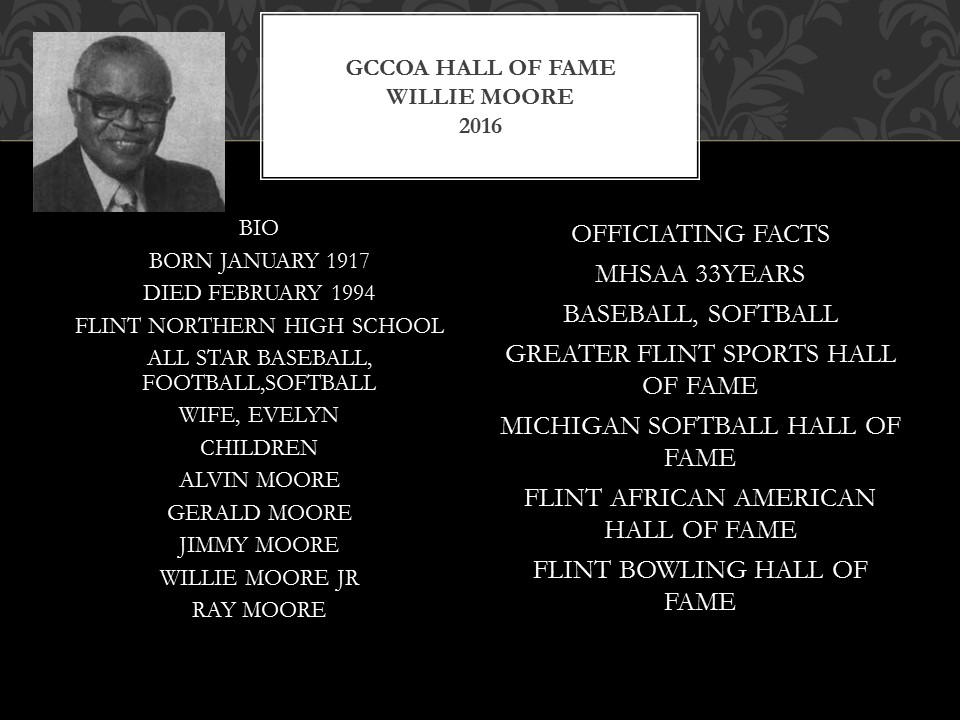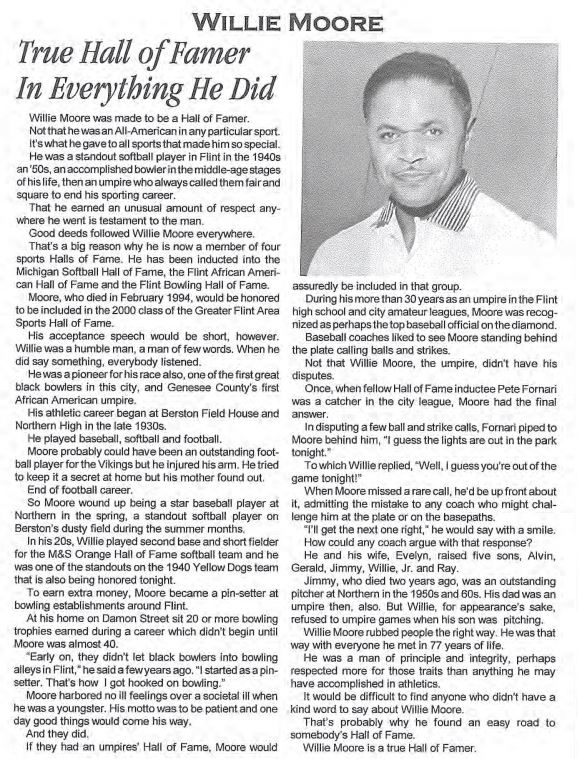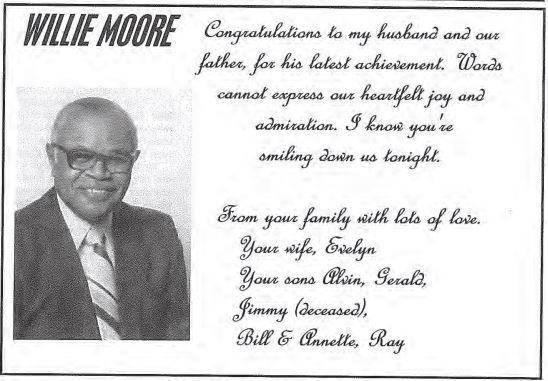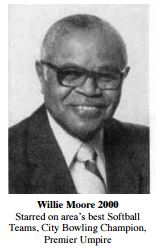
Greater Flint Hall of Fame
In Everything He Did

GFASHOF Congratulations

1986 Greater Flint Afro-American Hall of Fame

Son of Rueben and Millie Moore
Wife: Evelyn Moore
Sons: Alvin, Gerald, Jimmy, Billy, Ray
Without the acceptance of blacks in the City League, there was little hope that they would ever have an opportunity to reach the professional leagues in baseball, football or basketball. Therefore, for blacks, the emphasis turned to softball. When the first black team was admitted in the City Class-A League, Willie Moore was one of the players. He was part of softball’s rise to prominence as Flint’s leading pastime in an era when blacks were not role models. So many athletes of his time and circumstances did not have the opportunity to be so honored for their accomplishments and contribution in sports.
He played in many state tournaments from 1935 through 1950:
The Yellow Dogs 1940 State Champions
M&S Orange 1945 State Champions
M&S Orange 1945 National Regionals Champions
M&S Orange 1945 National Toumament-runners-up
One of the top four hitters in the 1945 World Tournament
M&S Orange 1946 Majors State Champions.
Moore was one of the top hitters in winning the State Majors Tournament.
Willie Moore missed by one vote of playing the short center position on the 1945 All-World Tournament Team. In 1945 he went through the State, Regionals and World Tournament with one error.
In 1947 Moore became the first registered black umpire in Flint baseball and softball. The M.H.S.A.A. chose Moore to umpire four Michigan High School State Tournament final games (1971, 72, 73, 74).
He received a certificate for officiating in the Michigan High School Athletic Association, Inc. He called balls and strikes for more than 26 years. Although he chose one of the most controversial jobs in sports. . umpiring … he continued to be one of Flint’s most respected and best liked sports figures throughout the state.
After retiring from softball and umpiring, Moore started bowling at age 41 and for his achievements he has received many honors. His accomplishments include high games of 288 and 289 and a top series of 694
He was a city singles 1960 tournament champion. The 1978 Men’s City Bowling Tournament was named in his honor. He served as an officer in the Flint Major Classic and Negro Bowling League. In 1985 Moore was inducted into the Flint Bowling Hall of Fame and this year, 1986, he was inducted into the Michigan Softball Hall of Fame.
Willie Moore passed his love of sports and fair play to his five sons as well as other youth throughout the City of Flint.
Willie Moore Bio

Willie Moore was made to be a Hall of Famer. Not that he was an All-American in any particular sport. It's what he gave to all sports that made him so special. He was a standout softball player in Flint in the 1940's and 1950's, an accomplished bowler in the middle-age stages of his life, then an umpire who always called them fair and square to end his sporting career. That he earned an unusual amount of respect anywhere he went is testament to the man.
Good deeds followed Willie Moore everywhere. That's a big reason why he is now a member of four sports Halls of Fames. He has been inducted into the Michigan Softball Hall of Fame, the Flint African American Hall of Fame and the Flint Bowling Hall of Fame. Moore, who died in February 1994, would be honored to be included in the 2000 class of the Greater Flint Area Sports Hall of Fame.
His acceptance speech would be short, however. Willie was a humble man, a man of few words. When he did say something, everybody listened. He was a pioneer for his race also, one of the first great black bowlers in this city, and Genesee County's first African American umpire.
His athletic career began at Berston Field House and Northern High in the late 1930's. He played baseball, softball and football. Moore probably could have been an outstanding football player for the Vikings, but he injured his arm. He tried to keep it a secret at home, but his mother found out. That was the end of football career.
Moore wound up being a star baseball player at Northern in the spring, and a standout softball player on Berston's dusty field during the summer months. In his 20's, Willie played second base and short fielder for the M&S Orange Hall of Fame softball team and he was one of the standouts on the 1940 Yellow Dogs team that is also being honored tonight.
To earn extra money, Moore became a pin-setter at bowling establishments around Flint. At his home on Damon Street, sit 20 or more bowling trophies earned during a career which didn't begin until Moore was almost 40. "Early on, they didn't let black bowlers into bowling alleys in Flint," he said a few years ago. "I started as a pin-setter. That's how I got hooked on bowling." Moore harbored no ill feelings over a societal ill when he was a youngster. His motto was to be patient and one day good things would come his way.
And they did.
If they had an umpires' Hall of Fame, Moore would assuredly be included in that group. During his more than 30 years as an umpire in the Flint high school and city amateur leagues, Moore was recognized as perhaps the top baseball official on the diamond. Baseball coaches liked to see Moore standing behind the plate calling balls and strikes.
Not that Willie Moore, the umpire, didn't have his disputes. Once, when fellow Hall of Fame inductee Pete Fornari was a catcher in the city league, Moore had the final answer. In disputing a few ball and strike calls, Fornari piped to Moore behind him, "I guess the lights are out in the park tonight. To which Willie replied, "Well, I guess you're out of the game tonight."
When Moore missed a rare call, he'd be up front about it, admitting the mistake to any coach who might challenge him at the plate or on the basepaths. "I'll get the next one right," he would say with a smile. How could any coach argue with that response?
He and his wife, Evelyn, raised five sons, Alvin, Gerald, Jimmy, Willie, Jr. and Ray. Jimmy, who died two years ago, was an outstanding pitcher at Northern in the 1950's and 60's. His dad was an umpire then, also. But Willie, for appearance's sake, refused to umpire games when his son was pitching.
Willie Moore rubbed people the right way. He was that way with everyone he met in 77 years of life. He was a man of principle and integrity, perhaps respected more for those traits than anything he may have accomplished in athletics. It would be difficult to find anyone who didn't have a kind word to say about Willie Moore. That's probably why he found an easy road to somebody's Hall of Fame. Willie Moore is a true Hall of Famer.